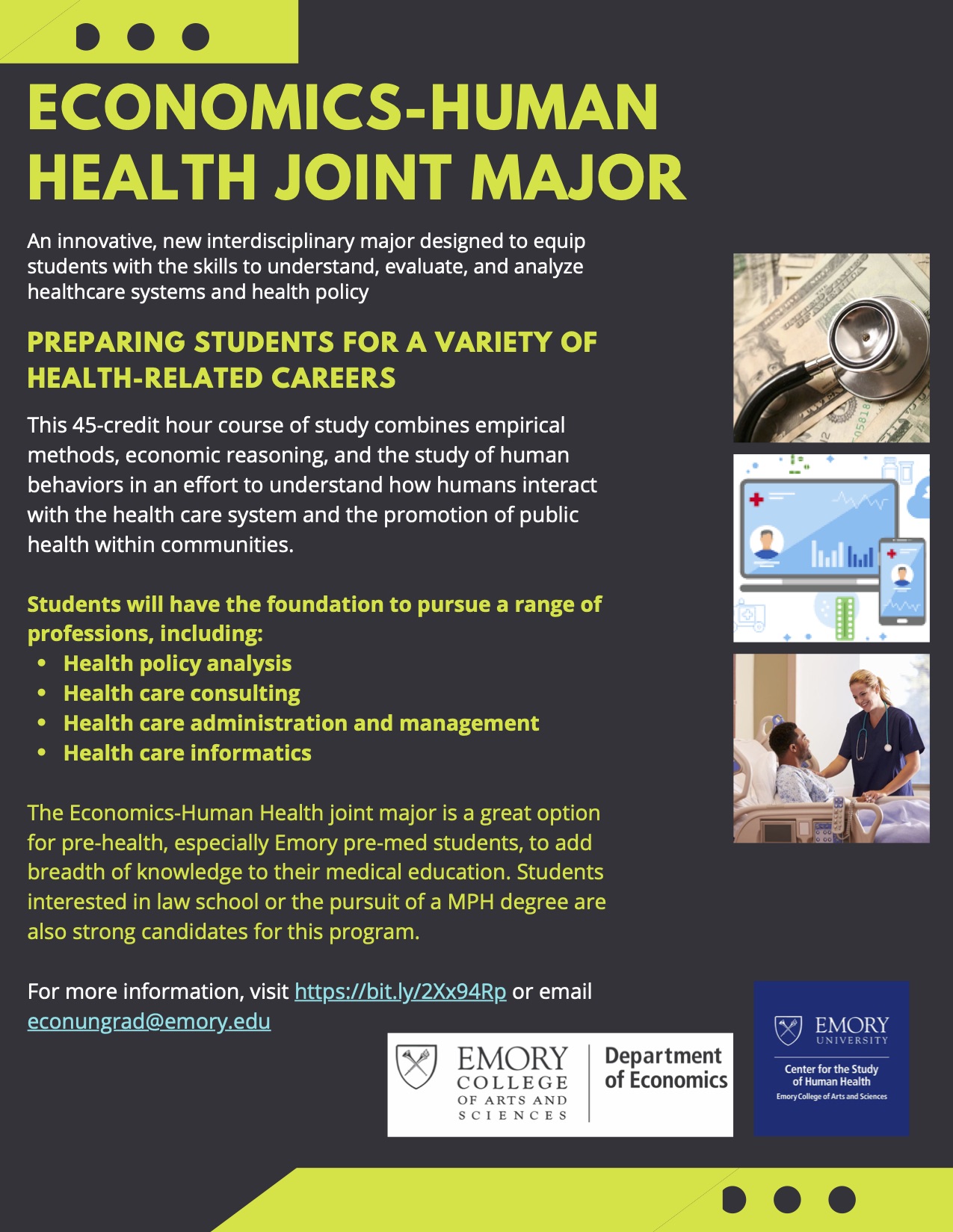
Academics
The Center for the Study of Human Health offers unparalleled opportunities for emerging scholars in health and well-being. Our students engage in a diverse array of academic inquiry and experiential exploration that emphasizes the future of health in a global context.
Explore Our Programs
The Human Health Major allows students to study health in an integrated, interdisciplinary model with a focus on the complex scientific and social problems involved in health and well-being.
The liberal arts program draws on faculty and resources from the College and University, including schools of medicine, nursing, theology, law, and public health.
Students will develop competencies in the following areas:
- Importance of the humanities in both expressing and experiencing human health
- Social determinants of health and health disparities
- Biological mechanisms underlying health
- Diverse methodologies in health research and implementation
- Ethical issues in health
- Environmental influences on human health
- Historical context of illness and health
The focus aims to build students’ critical thinking and analytic competencies in studies of population health. Students will learn about the ways in which we can study health in populations and the threats to the validity of these studies. With this foundational knowledge, students will go on to learn how to design and implement health research and be able to critique reports of health research as translated beyond science to the public and as it regularly appears in the news. The epidemiology focus is not a degree-granting program, but a portfolio of elective courses within the Human Health major (HTLH 207, HLTH 279, HLTH 306, HLTH 408).
This set of courses forms a focus of study that complements and builds on the core Human Health major requirements, progressively addressing complex epidemiological concepts that will help prepare students for careers in public health, medicine, research, business and more.
LEARN MORE
The Economics/Human Health Joint Major aims to provide students with a quantitatively-focused plan of study for understanding the health care industry and health care issues that face policy makers.
The curriculum offers students the opportunity to develop skills for analyzing economic issues related to human health in all its dimensions, including the interaction between health care and health policy.
This is a synergistic curriculum beyond what human health or economics can individually offer.
View this Joint Major on the Economics Department's website.

The Global Health, Culture, and Society Minor leverages a critical multidisciplinary perspective to meet challenges and opportunities arising from a complex interplay of political, economic, environmental, social, historical and cultural systems.
Students will develop competencies in the following areas:
- Importance of the humanities in both expressing and experiencing human health
- Social determinants of health and health disparities
- Biological mechanisms underlying health
- Diverse methodologies in health research and implementation
- Ethical issues in health
- Environmental influences on human health
- Historical context of illness and health
The Nutrition Science Minor exposes students to the science of human nutritional biology from the cellular basis to the whole body. The program recognizes the psycho-socio-cultural-ecological influences on dietary choices and the biological processes underlying health and disease from prenatal life to senescence.
Students will develop competencies in the following areas:
- Biological foundations of nutrition, including human physiology and biochemistry
- Effects of nutrition on chronic disease
- Role of nutrition in health promotion and disease prevention
- Biological mechanisms underlying health
- Basic epidemiologic and biostatistical methods used in nutrition science research
- Role of nutrition across an individual’s lifespan
The Predictive Health Minor re-introduces health and disease through a comprehensive lens of new technologies, medicine, public health, business, economics, the social sciences and humanities.
Students will explore a model of healthcare based on a personalized approach to health and well-being rather than the traditional disease-oriented model.
LEARN MORE
The Concentration in Health Innovation is a collaborative effort between the Center for the Study of Human Health (CSHH) BA Program in Human Health in Emory College and the Goizueta Business School BBA Program.
This concentration provides knowledge, competencies, and experiences for BA and BBA students interested in pursuing careers in a wide array of fields related to the business of health with a focus on innovation.
The Concentration in Health Innovation is open by application to business school students and Emory College students majoring in human health. During the junior and senior year, in addition to pursuing their own majors, students admitted to the concentration complete two core courses in the non-major program, two electives from a list of relevant choices, and one senior capstone. Additional seminars, industry speakers, internships, and field projects augment the resources available to concentration students.
BBA students who complete this concentration will gain an understanding of the cutting edge science of health with a focus on Emory areas of strength, including innovations in personalized medicine and health, applications and translations involved in global health, the science of nutrition and current challenges in changing dynamics within the medical system and health policy.
Human health students who complete this concentration will acquire grounding in the basic principles of business including management, marketing and operations and will develop foundational business practices that will help them be better stewards of limited financial, human, and organizational resources.
View the 2022 Berson Lecture here.